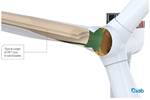SABIC novel bio-based LNP compound demonstrates reduced carbon emissions
Flame-retardant carbon fiber-reinforced compound offers a 17% reduced carbon footprint and does not alter the polymer properties of the incumbent material.

Photo Credit: SABIC
SABIC (Riyadh, Saudi Arabia) has launched a bio-based LNP THERMOCOMP DC0041PE-7M1D145W compound, said to offer customers a new sustainable option for demanding applications in electrical/electronics,
healthcare and other key industries. According to SABIC, the novel flame-retardant, carbon fiber-reinforced compound has a reduced carbon/energy footprint compared to its incumbent product, LNP THERMOCOMP DC0041PE-7M1D145 compound, while delivering the same properties.
For every 100 kg of the novel LNP THERMOCOMP compound, SABIC says, 21 kg of fossil-based materials have been replaced with bio-based materials derived from waste or residue, such as crude tall oil and hydrotreated vegetable oils, based on a mass-balance approach. Moreover, the company notes that this new compound was developed with more than 50% of recycled content from post-consumer recycled (PCR) resin and pre-consumer recycled carbon fiber sources.
According to an internal life cycle analysis conducted in accordance with ISO 14040/14044 protocols, LNP THERMOCOMP DC0041PE-7M1D145W compound can offer potential reductions in carbon footprint of up to 17% when compared to the fossil-based incumbent material. Critically reviewed SABIC primary data combined with the latest manufacturing data and industry average estimates were used in the cradle-to-gate comparison of these compounds.
Adding to its environmental value, SABIC says, the LNP THERMOCOMP compound complies with the requirements of the Registration, Evaluation, Authorization, and Restriction of Chemicals (REACH) Regulation and the Restriction of Hazardous Substances (RoHS) directive.
Further, while delivering greater sustainability, the new bio-based compound reportedly does not alter the polymer properties of the incumbent material, which include high temperature resistance, excellent mechanical performance and structural properties, good processability and halogen-free flame retardance. Because it delivers the same mechanical properties as the incumbent material, it can be used as a drop-in solution.
Potential applications for this injection molding product include thin-wall parts, such as housings for consumer electronics, and components like surgical instruments that require good dimensional stability.
Currently, LNP THERMOCOMP DC0041PE-7M1D145W compound is manufactured in Asia Pacific, with plans to expand local production to other geographies, as needed.
Related Content
-
Novel composite technology replaces welded joints in tubular structures
The Tree Composites TC-joint replaces traditional welding in jacket foundations for offshore wind turbine generator applications, advancing the world’s quest for fast, sustainable energy deployment.
-
CirculinQ: Glass fiber, recycled plastic turn paving into climate solutions
Durable, modular paving system from recycled composite filters, collects, infiltrates stormwater to reduce flooding and recharge local aquifers.
-
Plant tour: Middle River Aerostructure Systems, Baltimore, Md., U.S.
The historic Martin Aircraft factory is advancing digitized automation for more sustainable production of composite aerostructures.















